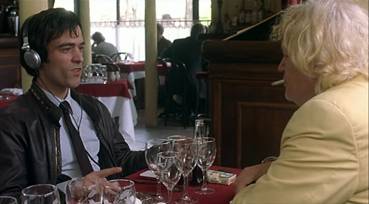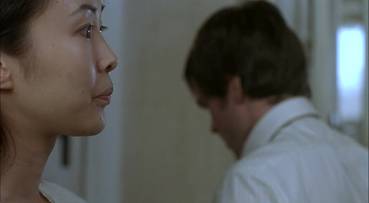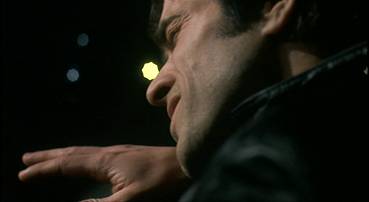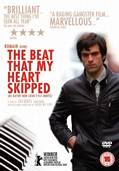| I
found her at sunrise Naked in my boots Standing in the fireplace Just picture her there The beat that my heart skipped Onto the bed I threw my whip Against her I pressed Her beauty struck me dumb |
|
| 'La
Fille di pere Noël' Jacques Dutronc and Jacques Lanzman |
As someone who is repeatedly dismayed by American remakes of European and Far Eastern movies, encountering a French remake of a cult American film presents me with a judgemental dilemma. It's over twenty years since I last saw James Toback's Fingers, an edgy crime drama from 1978 featuring Harvey Keitel at close to his best. Memories that old simply cannot be relied on, and yet with no present day access to the film it's impossible for me to re-evaluate it as a comparison piece. I remember being impressed and for some time enthusing about a film that no-one else I've since met seems to have seen. But that was, as I said, a long time ago, and I was a lot, lot younger and had a few thousand less films under my belt. Reviewers with better memories or better access have suggested that The Beat That My Heart Skipped [De battre mon coeur s'est arrêté] actually improves on Toback's original, which they felt was a more ragged and rough-edged film. But of course I like ragged and I like rough-edged. And with all of the awards that Beat has picked up – it swept the Césars, picking up Best Film, Direction, Screenplay, Cinematography, Editing, Music, Supporting Actor and promising Actress, as well winning the BAFTA for Best Film Not in the English Language – you'd think poor old Toback would get more than just a passing nod.
Which is not to deny that, on its own merits, The Beat That My Heart Skipped is one hell of a good movie. Arrestingly directed by Jacques Audiard, who attracted international attention with his 2001 Read My Lips [Sur mes lèvres], and built around a star-making turn by Romain Duris, it makes for consistently compelling viewing and at no point feels like a cash-in knock-off of the sort Hollywood is currently specialising in. A remake it may be, but the shift in locale and thematic focus has made for a vibrant and very distinctive work. You can't help but think this was in part the result of a split reaction to the original by the two screenwriters – offered the chance to helm a remake of any film he liked, Audiard immediately selected Fingers, while co-scriptwriter Tonino Benacquista hated the film and had to almost be bullied into working on a script even remotely based on it.

Duris plays brutish young Thomas Seyr, who makes his living with his two equally unpleasant friends Fabrice and Sami by buying up run-down properties for speculative development and clearing them of tenants through a process of sustained and sometimes violent harassment. Seyr's late mother was a renowned concert pianist, and one day Thomas chances upon her ex-manager Mr. Fox, who invites Thomas to audition for him. The suggestion revives in Thomas a long buried ambition to follow in his mother's footsteps, leading to a meeting with Chinese pianist Miao Lin, newly arrived in Paris and willing to train Thomas for the audition that could genuinely change his life.
I'm aware that the whole 'every thug has a sensitive side' thing may sound a little trite or implausible on paper, but it works so well here because it's clear that the uncaring brute that Thomas has become is at least partially the result of the pain and disappointment of not being able to follow his originally destinied path. Thomas was not born into this lifestyle, but drifted into it following the death of his mother, whom he clearly idolised. With her passing went his dreams of flowering under her expert tutorage, and all that remains is anger, ambition, and the close but still tempestuous bond he has to his father Robert (played by Niels Arestrup, a sort of weary Parisian ringer for Ken Russell), who also works in the seedier side of the property game and undoubtedly the one who introduced Thomas to this world. The relationship between the two is as intriguing one – when Robert plans to remarry he seeks his son's approval, but still uses him as a thug for hire, emotionally blackmailing him into threatening a restaurant owner who owes him money and then dismissing the action with a cursory "That wasn't so hard, was it?"
But it is Thomas's relationship with music that gives the film its distinctive identity and shapes its most compelling scenes. When not at work, music is his almost constant companion, whether it be the car stereo or the electro beat that thumps through his oft-worn headphones. Early in the story it is only in these moments that Thomas appears content, signposting the later re-immersion in classical music that his encounter with Mr. Fox triggers. This relationship is most vividly realised in the scenes with Miao Lin (something not in Toback's original) – the two have no common language apart from a few basic words of English and the sessions frequently explode in frustration and even anger, but the pair still communicate through a shared understanding of and passion for their art. Although Thomas has his share of affairs, they are, despite his claims to the contrary, essentially shallow encounters. For Thomas, sex is either the end result of lust or a manipulative tool – it's only sitting at the piano, whether alone at night or in Lin's flat with her seated at his side, that he really knows love. Despite their growing friendship and mutual understanding, Thomas's relationship with Lin remains a professional one, because it is not Lin that so compels him but his own engagement with the music, something echoed vividly in the film's splendid coda. This love affair is lost on his colleagues, who become increasingly frustrated by its distracting effect on Thomas and demand to know where the profit is in it. Thomas's response may be an obvious one, but it reflects a lesson he is inadvertently learning about his own life: "It's not about money," he tells them, "it's about art."

Crucially, events are viewed exclusively from Thomas's point of view, and I do mean exclusively. There's barely a shot he is not in and characters are introduced only when he encounters them, while backstory information is supplied through conversations Thomas has with others or actions he undertakes. The connection this creates between him and the audience may at first be an uncomfortable one, but as the man beneath the brute begins to emerge, a genuine bond is formed. This grows as the film progresses and reaches a peak when he is dragged out on a raid by his colleagues on the night before his audition, a disruption we know could jeopardize his best chance of turning back on this life forever. It's a scene that will really resonate with anyone who has had to struggle for anything against the odds.
Ultimately The Beat That My Heart Skipped deserves the widespread praise it has attracted. It tells its tale in stylish and compelling fashion, makes great use of a variety of music (the haunting Monkey 23 by The Kills will be humming around your head long after the credits have rolled) and dips its toes into the politics of the homeless and the activities of ruthless slum landlords, a situation not so different from any other European capital, London included. It's also beautifully played, with Romain Duris moving up to the European A-list in a role that he fits as if born to it, while Linh-Dan Pham brings an almost documentary realism to the key role of Miao-Lin. It may be more polished and less edgy than Toback's film, or at least what I remember of it, but takes the story to enough new places for it to happily co-exist with the original. Audiard even includes his own particular nod to Toback by repeatedly turning his camera on Thomas's hands, as he runs them over the keyboard or his mother's sheet music, mimes his piano playing in a bar, massages the neck of a girlfriend and dreamily copies the actions of another pianist. In the end, Thomas communicates most effectively, and directly, through his fingers.
| sound and vision |
The picture here is very good indeed, with sharpness, colour and contrast all very impressive and black levels absolutely bang on. There are a lot of night scenes in the film and detail even here is strong. This is the film I saw in the cinema, and then some. The transfer is anamorphically enhanced and framed 1.85:1.
There are two soundtrack options available, Dolby 2.0 stereo and Dolby 5.1 surround. Now despite the DTS logo on the end credits there is a suspicion here that the 5.1 track has simply been recoded from the stereo track – although a little more sprightly, the surrounds are sometimes randomly used, with the sound of actions that are taking place up front (Thomas placing a bottle down in the opening scene is a good example) emerging as loudly from the rear speakers as they do from the front. Music sounds fine on 5.1, although the stereo track is no slouch here either.
| extra features |
All of the extras here are on disc 2 of this double disc set, and here that second disc, unlike with a fair number of recent such releases, is most definitely justified. The majority of the extras are framed 4:3 and in French with optional English subtitles.

First up there are four Interviews, all of which provide interesting background info on the film. The first is with director Jacques Audiard (17:55), who talks about the choice to remake Fingers, the casting, the development of the characters, the music, and some of the themes explored by the film, and more. Some of this is repeated in the UK Exclusive Interview with Jacques Audiard (31:35), the only anamorphic 16:9 extra on the disc, also conducted in French but with fixed (but very clear) English subtitles. There's still plenty of fresh stuff to warrant this inclusion, including Audiard's favourite films from the 1970s, his views on the film's lead character ("a little piece of shit") and his entry into the film industry. He also discusses a reading of the final scene, so don't watch this before seeing the film. Co-writer Tonino Benacquista (8:21) talks about his initial reservations, the process of adapting Toback and the development of the characters. The final interview is with composer Alexandre Desplay (5:43), who talks about working with Audiard and, well, the score, as he would.
The term Deleted Scenes (24:44) is only partly accurate, as several of them consist of single, sometimes very short shots. But there are a lot of them, as the running time indicates, over 40 in total, all non-anamorphic widescreen and with timecode overlays. There is some VERY interesting stuff here, including aspects of the story that Audiard decided to drop – Thomas selling his piano and then, presumably after the awakening, deciding to keep it, and what happened between Robert and fiance Chris after Thomas persuaded her to go back to him. There are further sequences showing Thomas working with Miao and his relationship with music, the love affair overstated at one point when Thomas masturbates while sitting at the piano.
There are Filmographies for Jacques Audiard, Romain Duris, Emmanuel Devos (Chris), Linh-dan Pham, Tonino Benacquista.
Rehearsal Footage (9:48) covers readings for a number of scenes for the film, a couple of which include engagingly improvised moments of comedy from the actors. I always find this sort of inclusion interesting, not least for stripping the performances of the film's technical dressing.
The casually titled Q&A (49:09) was recorded at the Lumiére Cinema in London on 6th October 2005 after a preview screening of the film, and features Romain Duris, Linh-Dan Pham and Tonino Benacquista, with Tony Rayns hosting and translating. Once again this runs for a substantial length, although visually there's little variation, and with subtitles provided for all of the French responses, Rayns' verbal translations are largely redundant. It's still an interesting inclusion, not least for the questions asked by the audience, many of whom are fluent French speakers.
Finally there is the Original Theatrical Trailer (1:58), the original FRENCH trailer (with optional English subtitles), again suggesting that most of the extras have come from a French DVD release.
| summary |
The more I watch The Beat That My Heart Skipped the more I appreciate it as an original work in its own right rather than an inventive remake, though I would really like the chance to re-view Toback's original for comparison purposes. It may not make it onto my favourite films list (and it's a long list), but its still one of the more pleasurable experiences I had in a cinema in recent months, and absolutely worth 102 minutes of your time for its storytelling, its use of music, its performances and its stylish direction.
Artificial Eye have certainly delivered on the DVD, with a strong picture, decent enough sound and a nice pile of extras, which though interview heavy, are all interesting, and the deleted scenes are a must-see. Highly recommended.

